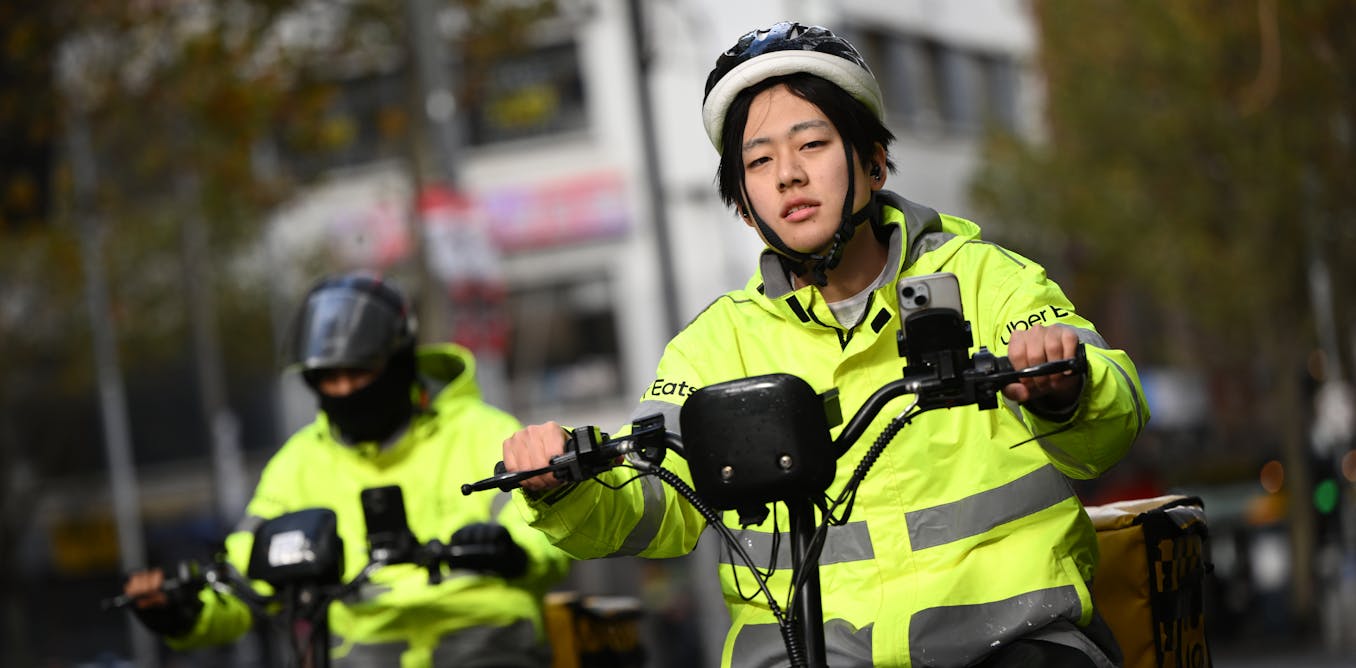Food delivery drivers could win a major pay boost and better working conditions, under a landmark deal jointly proposed by the Transport Workers’ Union and Uber Eats and DoorDash – Australia’s two biggest food delivery services.
Those improved conditions would include accident insurance for injured or killed workers. Eighteen delivery workers have died on the job in Australia since the union began tracking fatalities in 2017.
The deal is yet to be reviewed and decided by the national workplace tribunal, the Fair Work Commission.
But this would be an historic deal if the commission does ratify it. It would apply not just to Uber Eats and DoorDash drivers, but industry-wide to other food delivery companies, such as Hungry Panda. It would also set a precedent in other areas of the “gig economy”: from rideshare drivers to contract carers hired via digital job platforms.
News of the proposed deal came the day before rival food delivery company Menulog stops taking orders in Australia. From November 26, Menulog customers and restaurants will be redirected to Uber Eats.
So how likely is it this delivery driver deal will become law? How much would it improve delivery workers’ lives? And what impact could it have on the price and experience of getting a home delivered meal?
What’s proposed and why it matters
On Tuesday, the Transport Workers Union, Uber and DoorDash announced they had made a joint submission to the Fair Work Commission for a new set of minimum standards for contract “gig” workers.
The proposed standards would include legally enforceable new protections for those workers, including:
- minimum safety net pay rates for all classes of transport types, such as bicycles and cars
- new dispute resolution processes
- new engagement and feedback mechanisms
- representation rights, and
- accident insurance for injured workers.
That accident insurance is really significant. It would make it easier for families of dead or injured drivers who get hurt on the job to get compensation.
‘The guts of a future standard’
There are currently four cases before the Fair Work Commission to do with digital labour platform workers and road transport contractors.
Having the union and two of the biggest companies in this area agreeing is a significant step forward.
The commission still has to go through its usual processes. But it is now more likely to say yes to this proposed deal. Even if it ends up deciding to impose other conditions, this submission is likely to be the guts of a future standard.
If that happens, it would deliver major improvements in pay and conditions for one of the most vulnerable and fast-growing workforces in Australia.
Better pay could improve safety and deliveries
Pay is extremely important for safety. If you’re on low pay, you have to work faster and for longer hours.
The Australian Financial Review has reported the new safety net payment under this proposed deal would be 25% more than now: a minimum of $A31.30 up to $32 an hour.
That rate would depend on the transport used for delivery (less for a bike, more for a car). It would be enforced based on those hourly rates.
Under the current method of pay per delivery, riders and drivers have a strong incentive to rush to get the work done. This deal would address that pressure to engage in dangerous practices.
Reducing that pressure to rush each delivery could also lead to improved service.
And if anything does go wrong, there would be better mechanisms for the workers to talk to the company about what happened and improve future deliveries too.
What it means for delivery price rises
Uber Eats and DoorDash have been reported as saying they wouldn’t expect significant price rises as a result of this deal.
It’s worth noting this has happened just as Menulog – which had about a quarter of the Australian food delivery market, only behind Uber Eats – is exiting Australia.
There is an argument the remaining delivery companies now have an opportunity to offset higher costs for drivers by winning some of Menulog’s market share.
But even if there did end up being a small price rise as a result of this deal, customers could feel better about ordering home delivery, knowing workers would be getting a fairer, safer deal.
A precedent beyond food deliveries
This is a world-leading proposal.
It would mean people working as contract workers don’t have to be found to be an employee by a court to have minimum pay and conditions like this.
We’re expecting to see a similar approach come up at the Fair Work Commission in other areas soon, including on “last mile delivery” – such as Amazon Flex deliveries – and for rideshare drivers.
It could also be relevant for other types of contractors hired through digital labour platforms, such as aged care or disability care. An estimated 14% of Australian workers have been engaged through digital labour platforms in some form already.
This proposal would set a precedent for all those areas.
